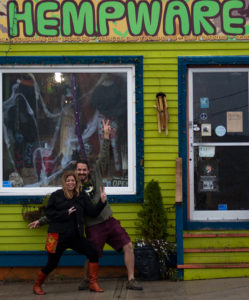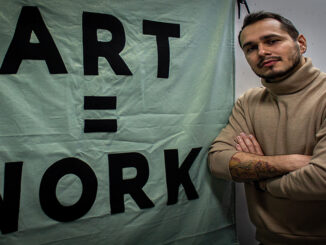With marijuana now legal, Nycki Temple-Delisle recounts her struggle with the law for selling pipes and papers
Andrew Waterman
Kicker
Nycki Temple-Delisle has always found it hard to remain in one spot.
“I always thought I was going to be a drifter,” she says. When she was 17 she moved from Blaketown to St. John’s, and from there to Vancouver and Jasper.
In 1997 at the age of 21, she returned from living on the west coast with her new boyfriend, Stefane Delisle. The plan for the couple was to stay for the summer to see friends and family, move back out west, save money, and travel to India.

While Stefane worked as a lifeguard, Nycki decided to take what little money she had and open a small store for the summer.
“Even as a kid I was always selling stuff,” she said. “I used to buy Mr. Freezies that were 10 cents and I would go set up and sell them for five.
“So I wasn’t really making money but I just always loved selling stuff. I love the whole idea.”
Nycki wasn’t planning on selling Mr. Freezies this time around, however. While living on the west coast of Canada, she took note of the hemp business. Seeing there was little of that in St. John’s, she saw an opportunity.
She also wanted to sell pipes, bongs, and papers. Not wanting to risk any potential trouble, she made some phone calls.
“I talked to the Crown prosecutor (and) I spoke to an RCMP officer who was in charge of street level drug crime,” she said. Everyone said she was good to set up shop.
A week after opening Hempware, a man walked into the store and bought a bong. He was an undercover police officer working with a joint RCMP/RNC drug task force.
Nycki’s mother, Lulu Temple, received a phone call that day. It was her daughter crying on the other end of the phone.
“She said, ‘I don’t know what’s going on but the place is full of police,'” said Lulu. “They got the doors locked. I’m not allowed to go out. No one’s allowed to come in.'”
For over an hour, Nycki was locked inside while the cops searched through all her products, taking everything that could be used for smoking or had a leaf on it.
“And that’s when it started.”
Nycki would be charged under section 462.2 of the Canadian criminal code, which to her knowledge, was meant for organized crime, not an individual. Given that many of her suppliers were Canadian, she couldn’t understand why her small store was being targeted.
Before the court case began, the crown prosecutor told Nycki if she pleads guilty to the charges, she’d be given an absolute discharge. All of her products would be given back to her. All she had to do was close up shop.
“At that point I still believed in the system,” Nycki said. “I said, ‘No. I did not do anything wrong. I refuse. I am not pleading guilty to something I have not done.
“And that’s when it started.”

The court case lasted over a year. During that year, Nycki’s eyes opened to the machinery of the justice system. At the very same time, they opened to the kindness of the community.
“We got so much support,” she said.
Two people she didn’t know went to every court date. They remain friends to this day.
People were writing letters to the Telegram. One of which, Stefane recalls, used the analogy that while the authorities were hunting for big game, a rabbit distracted them.
Her suppliers, despite just beginning their business relationship, restocked her.
“We didn’t even have to prepay for stuff,” she said. “They sent it express.”
Prayers were said for her at church and local bands organized fundraisers.
“I mean, God love ’em, right?” she said.
Marc Emery, Canada’s so-called Prince of Pot, sent her money to help.
“He used to call me his east coast Queen,” she said. “He even tried to get me to go out (there) and work for him.”
People who might not necessarily care about hemp, or even support the selling of pipes and bongs, thought what was happening to Nycki was unjust.
One such man drove a Ferrari and wore leather driving gloves. He would walk around the store picking out items, seemingly at random, while asking Nycki how everything was going. By the end of his visit he would have hundreds of dollars worth of products on the counter.
“He’d pop into the shop and just check up on me. I did not know who he was the first time he came in the shop.”
He would bring in inspirational poems and give her advice. He told her there was no such thing as bad press, it just depends what you do with it.
That man knew a thing or two about advertising. He was the man who brought commercial television to the province – Geoff Stirling, the well-known businessman who started the Herald, NTV, and OZFM.
“They just wanted me to (give up).”
Because of the on-going trial, Nycki had to stay in town, and her plans to go to India were off. In the meantime, she kept Hempware open.
“I thought, there’s no way I’m closing shop, just so (they) can think they drove me out of town,” she said.
In court, the attitude towards her was much different than the message she was getting from the public.
“It was horrible,” she said. “They just wanted me to (give up).”
At one point, it was brought up in court that the newsstand downstairs from where the trial was being held, was selling the exact same pipes that police seized from Hempware.
But authorities dismissed it and told her they were only dealing with her.
The week before her verdict was read in court, the store doubled in size because of all the ongoing support. Despite that, she was scared.
Janet Kelly, who owned Auntie Crae’s at the time, was her mentor and told her nothing would happen to her.
“She was my rock,” Nycki said.
But the support didn’t change the verdict – Nycki was found guilty.
Her mother, Lulu, was mad.
“All they put her through that year, and all of us,” said Lulu. “I mean, she wasn’t a bad girl … it was a bad year.”
According to Nycki, the judge accused her of ‘tarnishing the moral cloth of the youth of Newfoundland.”
But just a week later, at her sentencing, the judge had changed his tone and said she was just a young woman who didn’t know what she was doing. The judge gave her an absolute discharge.
“All they had to do was pick up the phone, or walk in my shop and say, ‘Hey, if you keep carrying this stuff, you’re going to get in trouble.“
That meant she wouldn’t have a criminal record but she would be stuck with her legal bills and wouldn’t get her paraphernalia back.
“Imagine the money they wasted,” she said. “Seriously, the money belonging to Newfoundlanders. Wow, eh?”
Nycki thought of putting in a constitutional challenge, but the cost of doing so would have been too high.
Everything that happened could have easily been avoided, Nycki said.
“All they had to do was pick up the phone, or walk in my shop and say, ‘Hey, if you keep carrying this stuff, you’re going to get in trouble.’
Had they done that, she said, she would have complied.
Looking back on it now, she says she can laugh.
“It’s hilarious, really.”
With marijuana now legal, Nycki thinks it’s going to be a good year for the economy and tourism, but admits there may be a bit of a learning curve for the country.
“We used to advocate for (decriminalization) a lot,” she said.
On Wednesday, Canada became the largest economy in the world to legalize cannabis and the second to do so. Uruguay was the first country to legalize pot.
“All (of a) sudden (decriminalization) wasn’t even on the books anymore,” she said. “It was right into legalization.”
In 2002, four years after the trial ended, Nycki and Stefane married. They now have two kids, two businesses, and travel the world – a promise they made to each other when they decided to keep Hempware open.
They haven’t made it to India yet, but say they’ll probably make that trip when the kids are raised.




That is quite a story!